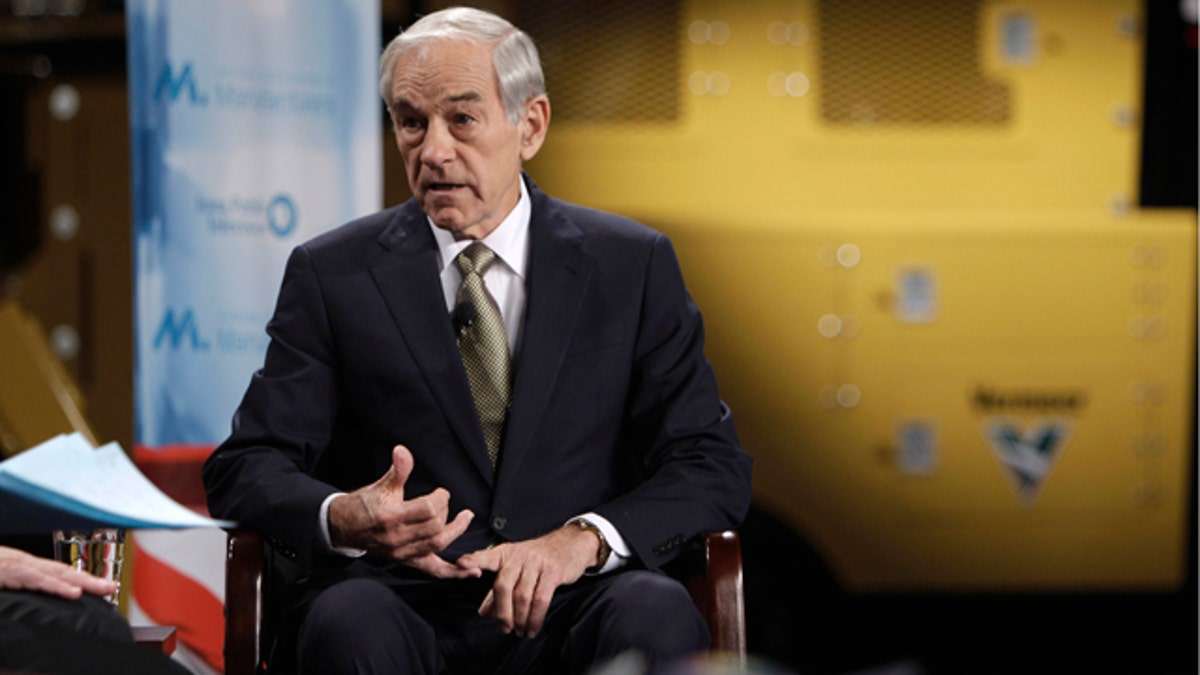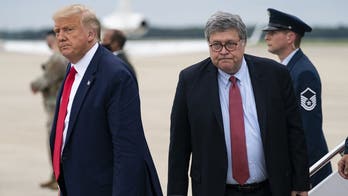
Nov. 1, 2011: Republican presidential candidate Rep. Ron Paul speaks during the Republican Presidential Forum on Manufacturing in Pella, Iowa. (AP)
Texas Rep. Ron Paul, fresh off a win in the Illinois Republicans presidential candidate straw poll, is ruling out an independent bid for the White House, saying he doesn't want to go that route.
"I have no intention doing that. That doesn't make sense to me to even think about it, let alone plan to do that," Paul told "Fox News Sunday."
Asked why, Paul responded: "Because I don't want to do it. That's the reason."
But Paul said that if he's not the nominee, he's not certain that he would support the GOP nominee.
"Probably not unless I get to talk to them and find out what they believe in. But if they believe on expanding the wars, if they don't believe in looking at the Federal Reserve; if they don't believe in real cuts, if they don't believe in deregulation and better tax system, it would defy everything I believe in," Paul said.
"And so, therefore, I would be reluctant to jump on board and tell all of the supporters that have given me trust and money that all of a sudden, I'd say, all we've done is for naught. So, let's support anybody at all ... even if they disagree with everything that we do," Paul added.
The three-time presidential candidate, and one-time Libertarian nominee, gave as an example Herman Cain, whose recent scrutiny over alleged sexual harassment claims isn't what bothers Paul.
"The allegations against his program, he's liking, you know, the Federal Reserve and his national sales tax -- yes, they are very legitimate and his support for bailouts, those allegations are very legitimate. Those other allegations, these problems that he had -- no, I don't think, I think the media blew this way out of proportion," Paul said. "He believes in the bailouts and the Federal Reserve and all this. I think that's what we should be talking about."
Paul said his proposal for getting the economy back on track would be to cut $1 trillion in the first year of his administration, and balance the budget in three years so that spending would be 15.5 percent of the gross domestic product.
But that would put government's ratio of GDP at its lowest level since 1951, and think tanks like the conservative American Enterprise Institute argue those kinds of dramatic short-term cuts would send the country back into a recession.
Paul said that's the argument made after World War II, when the budget dropped by 60 percent and taxes by 30 percent while 10 million people returned from war.
"We finally had an economic boom for the first time since the 1920s," Paul said of that time.
Among the cuts Paul is pursuing is to reduce the National Institutes of Health budget by 22 percent, reduce funding for the Centers for Disease Control by 38 percent.
Paul said those are two examples of functions that government is not properly authorized to conduct and get caught up in special interests and lobbying.
Research and development would be put on much smarter footing if the market conducts it, he added, because "when government makes a mistake, it hurts everybody. If a businessman makes a mistake in R&D, it hurts only that company."
"If you take all these resources out of the hands of the government, that doesn't mean the money isn't going to be spent. It means that the individuals are going to be spending it," he said.
Paul took a similar approach toward foreign policy, saying deploying troops, dropping drones in Pakistan, isolating countries like Iran through sanctions and spending $4 trillion over a decade to impose U.S. policy is hurting national security.




